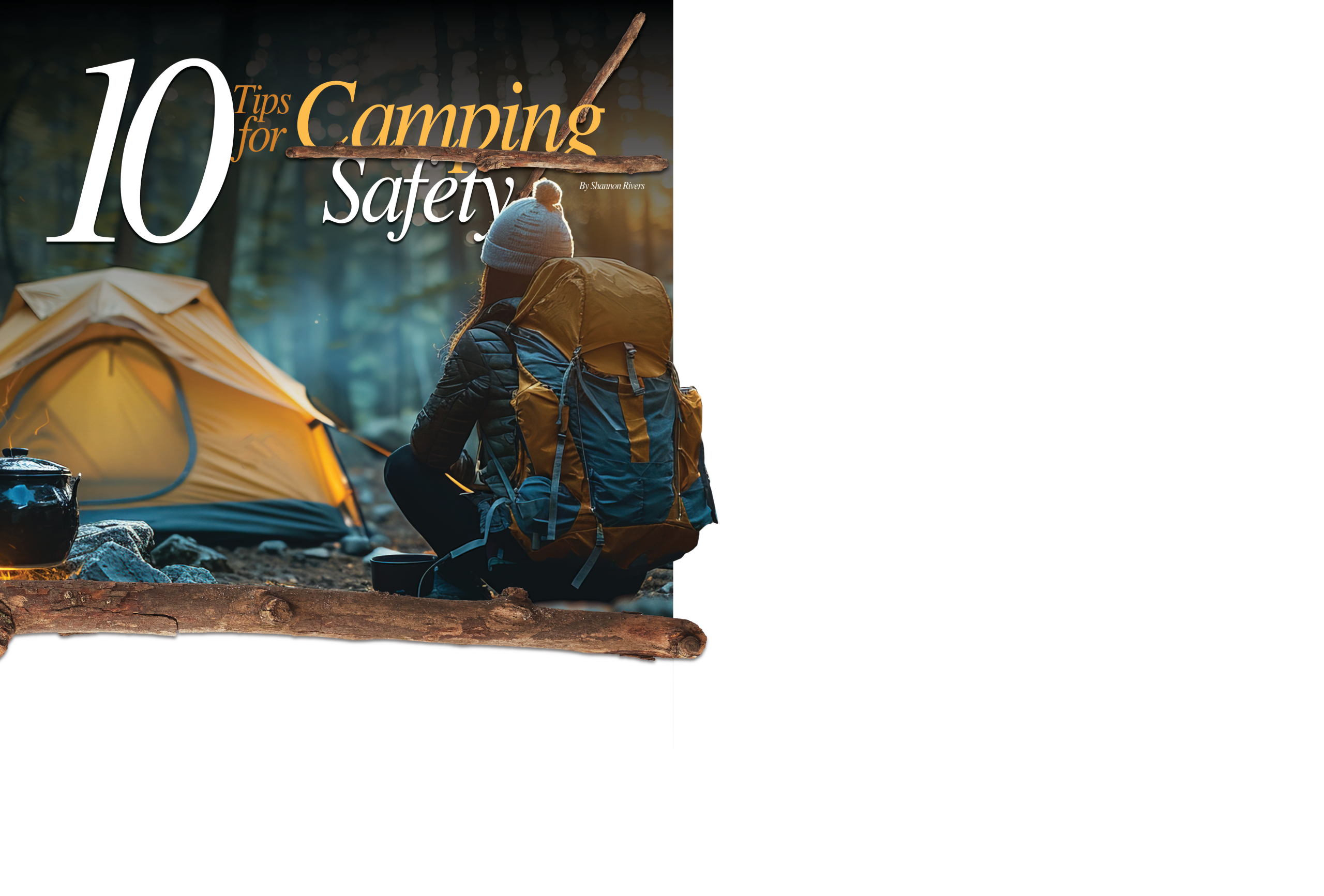10 Tips for Camping Safety

10 Tips for Camping Safety
Summer in Iowa means camping. And that means it’s time for you to connect with nature and experience the beauty of our state, even if it’s just for a few days. When it comes to camping and prepping for your trip there are some essential steps you should include to keep yourself and others safe. Of course, you will bring your basic equipment: cast iron, cooking pots, camp stoves, tents, campers, and sleeping bags. However, it’s crucial to prioritize safety while camping for a memorable and safe trip. Whether you’re a seasoned camper or going out for your first time, following camping safety tips can help prevent accidents and emergencies. In this article, we will explore 10 essential tips for camping safety to help you have a safe and enjoyable camping experience.
Get to Know the Area
Before setting out on your camping trip, thorough planning and preparation are first and foremost important for your safety. Research the campground or area you plan to visit and keep in mind a few towns that have general stores for emergency supplies and equipment, should you need some. Create a checklist of essential camping gear, including a first aid kit, food, water, appropriate clothing, and camping equipment, and pack accordingly. Planning and preparation are key to a safe camping trip.
Tell a good friend or family member about your camping plans, including your location, planned routes, and estimated return time. This information can be crucial in case of an emergency or if you fail to return on schedule. If possible, check in with someone regularly during your trip to keep them updated on your whereabouts, especially if you are hiking or primitively camping.
Campfire Safety
Campfires are THE BEST part of camping. You can’t beat sitting around the campfire with good food and good friends. Of course, they’ve functional for cooking and warmth, but they can also get out of hand quickly. Follow the campground’s rules and regulations regarding campfires and only light fires in designated fire pits or rings. Be aware of any campfire restrictions and current burn cautions or bans. Keep a safe distance from the fire and never leave it unattended. Keep a bucket of water or a fire extinguisher nearby to quickly extinguish the fire if necessary. Be cautious of hot coals or embers in or near your campsite. They can escape onto dry grass and light an unexpected fire. Always fully extinguish the fire before leaving your campsite or going to bed to prevent unwanted fires.
Be Weather Aware
Pack for changes in the weather. If you’ve been Iowa, you’ve probably heard “If you don’t like the weather, just wait 10 minutes and it will change”. It’s a popular phrase for a reason, the weather can change quickly, and storms can pop up out of nowhere. Check the weather forecast for your camping destination before leaving and check it throughout your trip. Be prepared for rain, wind, extreme temperatures, or other weather-related hazards. It’s not a bad idea to have a radio available to help you monitor approaching storms. Bring clothing for varying weather conditions, including rain gear, warm layers, and sun protection. In case of severe weather, such as thunderstorms or flash floods, seek shelter immediately and stay away from open areas, tall trees, or bodies of water.
Keep a First Aid Kit
A well-stocked first aid kit is a crucial component of camping safety. It should include items such as bandages, adhesive tape, antiseptics, tweezers, scissors, instant cold packs, insect repellent, sunscreen, any necessary medications, and other medical supplies that may be specific to your needs. Make sure to familiarize yourself with the contents of the first aid kit and know how to use them. It’s always a good idea to have some medicine and ointment ready for insect stings and bites, as well as poison ivy exposure. If you have specific medication or sever allergies, make sure you are prepared.
Stay hydrated
In the summer, it is super easy to get dehydrated, especially during hot weather or when you’re on the go fishing, hiking, or playing. Dehydration can lead to heat exhaustion or heatstroke, which can be serious and even life-threatening. Drink plenty of water throughout the day, even if you don’t feel thirsty. Keep electrolytes on-hand, like Gatorade or a sports drink. Carry enough water with you. You might invest in some bottled water or reusable insulated water bottles to keep you hydrated. Locate a reliable water source near your campsite, and drink regularly to maintain proper hydration levels.
Bring appropriate clothing
Packing appropriate clothing for the weather conditions is crucial for camping safety. As mentioned, weather in outdoor environments can change quickly, so be prepared for varying temperatures, rain, or other weather conditions. Some clothing is SPF rated to provide protection from UV rays. You might consider some of this clothing if you are going to be out in the sun all day. Bring rain gear, warm layers, and extra clothes to stay dry and warm. Night time temperatures can drop lower than expected, so be prepared to stay warm at night too. Avoid cotton clothing as it tends to retain moisture and can make you cold if it gets wet. Instead, you might opt for moisture-wicking and quick-drying fabrics for your camping clothing. Also, make sure to pack sturdy and appropriate footwear to protect your feet from rough terrain and to prevent slips and falls.
Insect repellent
Insects such as mosquitoes, ticks, and other biting insects can be prevalent in camping areas, especially in wooded or grassy areas. These insects can transmit diseases such as West Nile virus, Lyme disease, Rocky Mountain Spotted Fever, and other illnesses. Using an effective insect repellent on exposed skin can help prevent insect bites and reduce the risk of insect-borne diseases. It will make your stay much more comfortable if you prevent insect bites, rather than treat the symptoms after you’ve been bitten. However, there are some products, that can be applied to relieve symptoms after you’ve been bit.
Sunscreen
Spending extended periods of time outdoors during camping exposes your skin to direct sunlight, which can lead to sunburn and other skin damage. Prolonged sun exposure without protection can increase the risk of skin cancer, including melanoma, which is the deadliest form of skin cancer. Applying a broad-spectrum sunscreen with at least SPF 30 on all exposed skin, including face, neck, ears, and any other exposed areas, can help protect your skin from harmful UV rays. Remember to reapply sunscreen every two hours or more frequently if you are sweating or swimming, and seek shade during peak sun hours, usually between 10 a.m. and 4 p.m.
Lighting Options
There are several different light options you can use when camping. Flashlights and lanterns, for example, are staples for camping and provide a portable and versatile source of light. Look for flashlights and lanterns with LED bulbs, as they are energy-efficient and provide bright illumination. Make sure to pack extra batteries or bring rechargeable batteries and a charger to keep your flashlights powered throughout your camping trip. It’s also a good idea to have multiple light sources on hand for different purposes, such as a headlamp for hands-free lighting and a handheld flashlight for general use.
Solar-powered lights are a sustainable and eco-friendly option for camping lighting. They come in various forms, such as lanterns, string lights, and stake lights, and you can use it to light up your camping area, pathways, tents, or common areas at your campsite. Just make sure to place them in direct sunlight during the day to charge them.
Check Your Immediate Surrounding
Being aware of your surroundings is crucial for camping safety. When you arrive at your campsite, take the time to familiarize yourself with the area. Look for potential hazards such as uneven terrain, tripping obstacles and poison ivy. Avoid areas that seem unsafe. Keep an eye out for weather changes, such as incoming storms or rising water levels, and be prepared to adjust your plans accordingly. Additionally, be cautious when exploring unfamiliar areas. Being mindful of your surroundings and staying alert to potential hazards will help you stay safe while camping.
Camping safety should be a top priority to keep you safe and enjoyable outdoor experience. By following these 10 tips for camping safety, you can minimize risks and prevent accidents or emergencies. Prioritizing camping safety allows you to fully enjoy the beauty of nature and create lasting memories without compromising your well-being.
By Shannon Rivers


